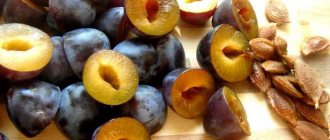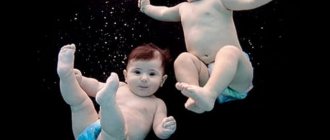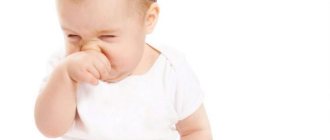A child eats sand: why does he do this, what is missing in the body, how to react to the situation?
Before sounding the alarm, parents should soberly assess the situation. A one-time prank does not require the use of special educational measures. It is enough for the mother to let the child know that she does not approve of his actions. This must be done calmly, as in cases when the baby puts something inedible in his mouth (a toy, his own finger, etc.).
Special measures are required only in cases where a similar situation is repeated at the first opportunity, and the child, aware of the prohibition, does it secretly. Swallowed masses of sand and soil can harm his health, and parents urgently need to not only stop the child’s bad habit, but also understand the reasons for its occurrence.
Desire to know the world
At an early age, taste and tactile receptors in the oral cavity become one of the important tools for understanding the world around us. Children process a lot of information throughout the day, developing memory, thinking, physical, language and communication skills. They learn by trial and error, analyzing their own sensations and signals coming from the people around them.
Answer from pediatricians and psychologists
According to scientists, non-standard behavior of children aged 1 to 3 years is the norm. At 4-5 years old, the same phenomenon requires consultation with a psychologist.
The craving for eating minerals is explained by doctors as a metabolic disorder. There is an opinion that with vitamin deficiency, lack of iron and calcium, a child eats sand and other minerals, instinctively replenishing their deficiency.
The entry of foreign substances into the digestive tract that are poorly digested can cause harm to the body. Cases where the baby ate the wrong thing should be considered from the point of view of his safety. Natural and building materials contain toxins, harmful bacteria, and intestinal parasites.
Parents, especially if the craving for inedible things does not go away by 2-3 years, should take into account the psychological aspects of the problem:
- the baby, experiencing a lack of parental attention, demonstratively eats sand in order to provoke an emotional reaction from mom and dad;
- a type of protest - secret pranks in the form of eating obviously forbidden things;
- similar behavior is adopted from other children in efforts to establish communication with them.
What should parents do if their baby eats sand or soil?
After the baby has eaten sand, parents need to monitor his well-being and stool, and if problems arise, immediately consult a doctor.
An Activated Charcoal tablet will help neutralize toxins. Over the next few weeks, you will need to be tested to detect intestinal worms.
You should also pay attention to the condition of the oral mucosa and skin to eliminate the risk of developing infections and viral infections.
Such an incident should not cause the cancellation of games and outings. Parents need to reinforce the ban in practice by controlling the child’s behavior in the same environment.
How to wean it off?
The first thing to do is to prohibit putting sand and stones in your mouth, without making exceptions and without losing sight of the baby. This way you can observe the child to find out the motives and degree of desire to repeat the prank.
Everything must be done to ensure that obedience, or compliance with established rules, becomes a conscious decision and is not based on fear. When you see a child who has eaten sand, you should suppress panic and try to react to the situation as calmly as possible.
Mom can show her concern and try to persuade her to spit the contents out of her mouth. If the parents' reaction led to hysteria and resistance, you need to distract the baby.
With children over two years old, you can continue educational work later, explaining in a calm environment why you should not put dirty things in your mouth.
Smaller children will not accept such a conversation; you will need to repeat the situation to reinforce it, teaching them exciting games in the sandbox, or digging in the ground with a spatula.
How to prevent such situations?
As soon as a little person begins to walk and run independently, a new stage of education begins, when parents have to deal not only with his development, but also take safety measures. The baby is not yet aware of all the dangers that await him, and in order not to intimidate or suppress the child, making comments to him at every step, you have to use tricks.
Before going to public sandboxes, which do not comply with sanitary standards, you can arrange a rehearsal at home - buy a tray and fill it with special harmless sand for children, introduce the baby to the pleasant crumbly texture, and gradually teach him not to put it in his mouth, to protect his nose and eyes from sand.
Here's how to avoid (or minimize) sand and soil eating:
First. Walk not in the sandbox, but on the asphalt. Although it doesn't always save. There are children who turn towards the lawn, even if it is at a great distance. I have just such a child!
Second. Occupy baby's mouth. Some children can chew dryers in their mouths for hours (an excellent option is that the child is practicing chewing, but his mouth can no longer accommodate the sand).
Third. Distract the child. For this purpose, toys, soap bubbles, rustling bags, active actions (“catch up, catch up”, “top-top with your feet”, pick up in your arms and “fly-fly”) will be useful.
Interesting: Is it possible to feel the fetal heartbeat in the early stages?
Should you see a doctor?
If, despite all your efforts and tricks, the child continues to put into his mouth everything that comes to hand, then you should seek qualified medical help! Timely intervention by an experienced specialist can help you wean your child from the addiction.
Do all children eat sand (earth, clay, chalk)
The curiosity of most kids leads to the fact that at least once they will try either sand, or earth, or a pebble lying on the ground, or all of this together. The desire to eat inedible objects is called geophagy in medicine. And this behavior is considered normal if your baby’s age is up to one and a half to two years.
If a three-year-old toddler continues to chew chalk, chew clay and earth, this most likely indicates a low level of hemoglobin (iron deficiency anemia), a lack of calcium or other important elements in the body.
Why is eating sand dangerous and how can you stop your child from doing it?
We all know that sand is not sterile, and if a child tastes newly built Easter cakes, parents should be worried.
Public sandboxes can become a breeding ground for bacteria that can lead to problems in the baby’s digestive system or cause the appearance of helminths. It is also worth considering that such sandboxes often become a toilet for yard animals.
Therefore, the question becomes relevant: how to wean a child from trying his culinary creations made from sand?
If the baby did this for the first time out of curiosity, then you shouldn’t make a problem of incredible proportions out of it, because your child is just exploring a new part of the world around him.
In this situation, it would be advisable to calmly explain to him that eating sand may cause a tummy ache and he will have to go to the hospital. Do not threaten your child with ending the walk, much less with physical punishment.
The position of non-violence is very important here, since games in the sandbox themselves are very useful for developing a child’s imagination, fine motor skills and tactile sensations.
Don't forget to check your child's health, take tests for the absorption of various substances and consult with pediatricians, general practitioners and allergists. Only after a comprehensive examination of the child’s body, medical workers will be able to prescribe your baby a course of necessary vitamins and minerals.
If a child eats sand to attract the attention of adults, then dealing with this behavior will be much more difficult. This will need to be done not only during walks on the playground, but around the clock.
You should become the initiator of fun games and activities, show more affection and care towards the baby, then he will not have the need to beg for your attention, including in such risky ways.
Consulting with a psychologist will not be superfluous.
One of the effective methods of getting rid of this habit can be the game “edible - inedible”, the rules of which every adult knows. Among all the words, you need to repeat the word “sand” quite often. After a few games like this, your baby will remember that it is not for food.
The health and safety of children is the concern of parents!
Watch the baby
Some doctors believe that a child eats exactly what is prohibited due to age characteristics - in order to understand the world around him. They say that with age, this bad habit will disappear on its own. Therefore, it is advised to simply closely monitor your child during walks.
While playing in the sandbox, some children are so keen on “making” pies, Easter cakes and other “sweets” that they mechanically pull them into their mouths.
Sometimes children pick up pebbles and also send them after the pies. This is where the mother should catch the child by the hand and not allow her to do this.
It’s good if the baby understands the explanations, but the younger the child, the less likely he is to be able to understand your explanations.
You shouldn’t be afraid to scream either - this is the age when everything forbidden seems most desirable to a child! The stricter the ban for a child to eat chalk or sand, the higher his interest in the forbidden will be. The baby will be even more eager to try what he was forbidden to eat!
It is better to distract the baby by switching his attention to something else. In principle, your little one’s desire to taste everything should disappear over time.
A child ate sand from a sandbox, what should I do?
What to do if a child eats sand?
A child ate clay, what should I do?
The child has eaten too much dirt, what should I do?
Communicate calmly with your child.
Give him some water to drink and try to induce vomiting; if that doesn’t work, drink plenty of warm drinks and eat only liquid food during the day. Everything should come out naturally.
Don't worry and don't panic.
A child won’t be able to eat a lot of sand, since it’s not tasty, but a pinch of sand won’t do any harm. The only danger is that you can become infected with worms, but you can become infected with them even without sand by petting an infected dog or cat.
Interesting: Doctor mom, can cough lozenges be used for pregnant women?
Our baby (he is 1 year old) managed to “eat” the earth several times this summer. If you overlook it, he might end up in a flowerbed or swallowing dirty potatoes into his mouth. Even now (in winter) he will climb into a pot with an indoor flower and pick at it (maybe in his mouth, you have to try).
If you have eaten a lot (which is doubtful), then it is better to do a gastric lavage with a weak solution of potassium permanganate. But don’t torture a child like that if he ate a little earth.
After all, if you eat a little, then nothing bad will happen. Let him drink a lot of clean water this day.
The only downside is that there could be worm larvae in the soil or sand. The sand will come out, but the worms may remain.
Therefore, you can give something choleretic to your child, for example, choleretic herb. Corn silk or choleretic collection. But follow the recipe on the package!
If possible, it is better to consult a pediatrician.
So, what to do if a child ate sand or soil?
Step 1. Don't worry.
Step 2. Distract him and (or) try to negotiate. Calm, monotonous, boring. Without unnecessary emotions - see step one!
Step 3. Promise yourself that at your next visit to the pediatrician you will be asked about the need to prescribe prophylactic anthelmintic drugs.
Step 4. Walk, enjoying how the baby learns about reality. We remember that sand and earth provide rich material for the development of a child’s fine motor skills, expand his sensory experience and, as a result, help develop speech?
As a conclusion. I spent yesterday’s walk in an inclined position: I grabbed the child’s hand with the earth and explained in a boring voice: “We don’t eat earth!” Today everything was different. The child was busy with last year's leaves, pebbles, twigs and again the earth.
And I had time to film his experiments. It will probably take some children more time to believe that such interesting and attractive things are inedible. And it’s quite possible that my baby will want to taste them again.
But I will again follow the same advice that I give to you!
- https://www.deti34.ru/simptomy/obshchee-sostoyanie/pochemu-rebenok-est-pesok.html
- https://rojaismelo.ru/analizy-rebenka/esli-sest-pesok-chto-budet
- https://razvitie-malysha.ru/pochemu-rebenok-est-mel-zemlyu-ili-pesok/
- https://40-nedel.ru/1032-Pochemu-rebenok-est-pesok.html
- https://happykids.su/vospitanie/rebenok-est-pesok
What should parents do if their baby eats sand or soil?
This article talks about typical ways to solve your issues, but each case is unique! If you want to find out from me how to solve your particular problem, ask your question. It's fast and free
!
After the baby has eaten sand, parents need to monitor his well-being and stool, and if problems arise, immediately consult a doctor. An Activated Charcoal tablet will help neutralize toxins. Over the next few weeks, you will need to be tested to detect intestinal worms. You should also pay attention to the condition of the oral mucosa and skin to eliminate the risk of developing infections and viral infections.
Such an incident should not cause the cancellation of games and outings. Parents need to reinforce the ban in practice by controlling the child’s behavior in the same environment.
Why does a puppy eat dirt?
The owner of a small, curious puppy is truly horrified when he notices that his pet is showing increased interest in the ground. The pet not only sniffs, but also begins to eat the soil. Along with the soil, the animal swallows small stones that are not able to be digested in the digestive tract.
Penetrating into the stomach, and then into the intestinal tract, the stones injure the delicate mucous membranes, provoking the development of inflammatory processes. In addition, the puppy can damage the tissue of the teeth, choke or even suffocate. To wean a child from such a habit, it is necessary to find out what was the fundamental reason for such behavior.
Pica is a syndrome that occurs in the body of an animal, pushing it to eat non-edible objects. A puppy who eats dirt and rocks suffers from pica.
The owner is confident that he is giving the pet everything necessary for full growth and development, without understanding the reasons for the occurrence of deviations of this kind.
It is important to understand that eating disorders may be associated with physiological needs, or may indicate the development of serious pathological processes in the puppy’s body.
Causes
A novice dog breeder always tries to analyze what caused the appearance of pica in his pet. Some owners do not pay attention to this behavior, some scold and beat the baby, trying to stop this behavior.
https://www.youtube.com/watch?v=xMt0-pNzJP0
Veterinary experts say that if a puppy eats soil, his body may develop a serious disease or such behavior is associated with psychological factors. The causes of pica in a puppy are as follows:
- Getting to know the world around you
. A small puppy may eat dirt simply because he is interested in what it tastes like. The baby can try stones, sand, leaves and branches. Thus, the puppy gets to know the world around him by building a picture in his head. If the animal is healthy, over time, eating the soil fades into the background, and subsequently disappears completely. - Lack of attention from the owner
. Some puppies and adults may begin to eat the soil in order to further attract the attention of the owner. In any case, the owner will pull away or shout at the animal. This behavior is associated with psychological changes. - Depressive states, discomfort and depression
. Constant long-term separations from their beloved owner have an acute negative impact on the psychological state of the puppy. The cause of depression and, as a result, pica, can be the appearance of a new animal or child in the house. A stressful state pushes the animal to extraordinary actions. Always a calm dog, it can start chewing shoes or doing dirty tricks, including eating dirt. - Lack of important microelements in the body
. With an unbalanced diet, important microelements such as calcium and carbon do not enter the body in the required volume. The animal, under the influence of instincts, tries to independently fill the deficit, paying attention not only to the soil and stones, but also tastes the sand and gnaws on the walls. - Digging holes and eating soil is normal for a puppy living in a private sector
. The dog simply senses small animals living in the ground, therefore, under the influence of hunting instincts, it tries to get to potential prey.
There are also dangerous diseases that push the animal to eat the soil on a subconscious level. One such internal disorder is immunodeficiency. As a result of a rare and quite dangerous disease, the body of a puppy and an adult dog is not able to adequately respond to the invasion of viral agents, pathogenic bacterial and fungal microorganisms.
Metabolic processes in the dog's body also undergo changes - the necessary vitamin and mineral complexes supplied with food are not able to be absorbed in the required volume, which leads to serious changes in all systems.
Against the background of immunodeficiency, iron deficiency anemia often develops. The number of red blood cells that carry iron-containing protein is sharply reduced. As a result, this leads to hypoxia or cellular oxygen starvation. At the same time, the dog tries to replenish iron reserves on a subconscious level by consuming soil on the street or eating soil from pots at home.
Why is eating soil dangerous?
If the owner notices that the puppy is eating earth and stones, it is not recommended to ignore it. A habit should not be allowed to become ingrained and part of normal behavior.
Perversion of eating habits, including eating stones, threatens serious disorders on the part of the body. The digestive tract suffers first.
Eating land has the following serious consequences:
- Intestinal obstruction. Blockage of the intestinal tract can occur gradually or occur instantly due to stones swallowed along with the soil. The hard stone is not digested, clogs the intestinal lumen and provokes its obstruction. Depending on the location of the foreign object in the intestine, symptoms occur. When a stone obstructs the upper intestinal tract, an acute period occurs with nausea and eruption of gastric contents. The stool from the anus is liquid, with the presence of blood fractions. Lack of timely qualified assistance leads to death. Treatment consists of surgical manipulation.
- Damage to the structure of the teeth, damage to the tissue structures of the pharynx. If an animal damages the enamel of teeth, it cannot be restored. The puppy will experience pain and discomfort, and the quality of chewing food will deteriorate significantly. In addition, damage to teeth and soft tissues of the oral cavity poses a risk of infection and further development of inflammatory processes.
- Esophageal injuries. Particularly dangerous are small swallowed stones with sharp corners. There is a risk of injury to the esophagus and bleeding. It is extremely difficult to detect such a pathology, as well as to operate.
- Regular eruptions of gastric contents, stool disorders (diarrhea and constipation). Dyspeptic disorders are a normal physiological reaction of the body and the digestive tract in particular to the ingestion of foreign objects.
If a small puppy swallows a large rock, it can become lodged in the throat and cause spasms. As a result of pathological changes, lack of air leads to asphyxia and death.
The danger comes not only from a stone swallowed while walking, but from soil treated with chemicals. Various toxic chemicals and pesticides used to treat soil against pests can cause serious intoxication, even death, if they enter a dog’s body.
What measures to take
An experienced breeder, dog handler or veterinarian will tell you what to do if a puppy eats stones. If you notice that your puppy is interested in an inedible object, you should not rush to wean him off yourself. First of all, you need to come for a consultation to a veterinary clinic. Perhaps the cause of pica lies in serious violations of internal processes.
During an examination by a veterinarian, the little patient will undergo a number of necessary laboratory tests. Based on the results obtained, the doctor will be able to give advice. If the reason lies in psychological aspects, it is advisable to seek help from dog handlers. Experts recommend the following:
- Under no circumstances should you scold, punish or use physical force when an animal eats soil. A puppy who eats soil out of boredom and to attract the owner’s attention will only be happy with such actions. A cause-and-effect relationship is firmly established in his subconscious - I eat soil - the owner pays attention.
- Make a loud scaring sound when the puppy tries to eat the ground. This could be clapping your hands, stamping your feet.
- During the period when your puppy's teeth are changing, it is recommended to take his favorite special toys with you while walking outside. Once the puppy gets bored, you can distract him with a toy. It is important that there are several of them.
- Attend. An important point, compliance with which will not allow the puppy to feel lonely and resort to eating the ground. It is necessary to walk a lot with the baby, conduct training, run and play. It is extremely important to talk, praise and hug your pet.
Selection of the optimal balanced diet. Proper nutrition plays an important role in the process of combating pica.
If an animal lacks minerals and vitamins, it will look for alternative methods to replenish them. The puppy may begin to chew wallpaper, furniture, and lick walls.
If the owner cannot independently wean the dog from eating earth and stones due to lack of time or opportunity, it is recommended to contact a dog training school. During training classes, your pet will be taught obedience and following commands. As a rule, several sessions with a dog handler are enough to wean a puppy from eating soil.
Why does a child eat soil and sand, what does the body lack and what to do?
Often parents are faced with a problem when their baby tries sand from the sandbox or takes a palmful of earth and puts it in his mouth.
Why do children eat inedible things? Unfortunately, not every adult tries to understand the essence of the situation, find out the reasons and draw conclusions. In medicine, the desire to eat inedible objects is called geophagy.
This behavior is considered normal when the child is 1.5-2 years old.
It is normal for a 1.5-2 year old child to taste soil and sand.
Why do children eat sand and soil?
What to do if a child eats sand or feasts on earth? What should the parents' reaction be? First, find out the reason for eating such substances. If your child has done this for the first time, then it’s too early to panic - kids are extremely inquisitive, so they learn new subjects.
In such a situation, it is recommended that mom or dad calmly explain to the baby that there is no need to do this. You should not frighten him with the end of the walk, since in this way the baby shows a normal desire to understand the world around him. Experts are confident that this phenomenon will pass as they grow older.
Psychological reasons
Psychologists are of the opinion that eating sand is a consequence of certain psychological factors. This is what children who experience a lack of attention from their parents do. It is quite normal that as soon as a mother catches her child eating sand, she will immediately rush to save him. Similarly, children express their protest against the prohibitions of adults.
What to do to prevent this behavior in your baby? First, reconsider your time together while walking. Play more with your child, spend less time talking on the phone and communicating with other mothers on the playground.
Find something to keep your baby occupied so that he doesn’t have the desire to put foreign objects in his mouth.
Lack of useful minerals and substances in the body
Pediatricians say that the reason for the baby’s strange behavior is a lack of certain vitamins and minerals in the body. Thus, on an instinctive level, children make up for their deficiency.
If a baby eats sand, most likely there is not enough silicon in his body. An insufficient amount of this mineral can further provoke joint disease and even anemia. When the little one has eaten enough soil, this indicates a low hemoglobin content, iron deficiency and vitamin deficiency. In such a situation, you need to do the following:
- undergo examination;
- get tested;
- find out how well the baby absorbs calcium;
- consult your pediatrician.
What to do if your baby eats sand or inhales it?
What to do if a child eats sand? Parents should not panic. The baby needs to rinse his mouth and give him clean water to drink.
There is no need to immediately buy anthelmintic drugs or activated carbon. When a child has eaten sand, swallowing it in large quantities, he needs to be monitored for a couple of days.
Most likely, the inedible substance will be released in full naturally.
The main thing is that the little one does not develop alarming symptoms: nausea, fever, mucus in the stool and greenish color of the feces. In this case, you will need urgent medical attention. For prevention, you should be tested for enterobiasis to rule out the presence of parasites in the intestines.
If the baby has inhaled large quantities of grains of sand, they must be removed from the respiratory tract. The baby is placed on the adult's hand, head down, and lightly tapped on the back with the palm. After this, the baby should be given something to drink. It is necessary to consult a specialist when, after inhaling sand, a long cough, attacks of suffocation, vomiting, etc. continue.
If after eating the “delicacy” the baby’s condition worsens, you should consult a pediatrician
How to wean a child from eating inedible things?
Most often, eating inedible things does not become a systematic activity, but as soon as your baby eats sand again, try to distract him.
Show him a new toy, a cat running past, a plane in the sky.
If you notice that such a child’s reaction was the result of your inattention to him, then show more care, put aside your worries, talk to the child, play games together.
You can satisfy your baby’s interest in bulk materials using safer methods - scatter different types of cereals and pasta on the table at home. Play with these items, put them in piles, sort them, put them in jars or plates. Surely the child will appreciate this activity.
Concern should be expressed when a child eats inedible things, including sand, for an extended period of time. You need to contact specialists when this continues at a more conscious age, if your child is 3-5 years old.
Interesting:
Share with friends on social networks
Why does a child eat soil, sand or stones?
Before sounding the alarm, parents should soberly assess the situation. A one-time prank does not require the use of special educational measures. It is enough for the mother to let the child know that she does not approve of his actions. This must be done calmly, as in cases when the baby puts something inedible in his mouth (a toy, his own finger, etc.).
Special measures are required only in cases where a similar situation is repeated at the first opportunity, and the child, aware of the prohibition, does it secretly. Swallowed masses of sand and soil can harm his health, and parents urgently need to not only stop the child’s bad habit, but also understand the reasons for its occurrence.
Doctor Komarovsky's opinion on the problem
Children eat sand and put stones in their mouths most often in the second year of life. As Dr. Komarovsky notes, it is during this period of life that the child’s behavior changes.
If infants grab and try everything reflexively to develop motor skills or satisfy the sucking reflex, then from the age of one year the process of intellectual cognition and personality formation begins.
Violating prohibitions is a healthy reaction that you need to take for granted and patiently build a relationship with your baby, even if he behaves unconventionally.
How to wean it off?
Everything must be done to ensure that obedience, or compliance with established rules, becomes a conscious decision and is not based on fear. When you see a child who has eaten sand, you should suppress panic and try to react to the situation as calmly as possible.
Mom can show her concern and try to persuade her to spit the contents out of her mouth. If the parents' reaction led to hysteria and resistance, you need to distract the baby. With children over two years old, you can continue educational work later, explaining in a calm environment why you should not put dirty things in your mouth. Smaller children will not accept such a conversation; you will need to repeat the situation to reinforce it, teaching them exciting games in the sandbox, or digging in the ground with a spatula.










